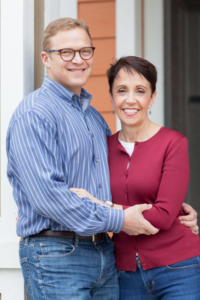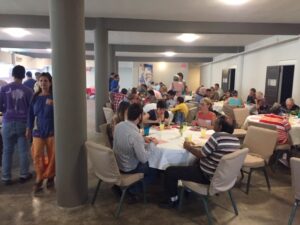Alumni Spotlight
Matt Soper
Tell us a bit about yourself.
I grew up in New Orleans in a nominally church-going family but had a powerful conversion experience just before my senior year at Rhodes College and was baptized in 1983 at the DeGaulle Ave. Church of Christ. A year later I took my new business degree and moved to Houston for my first job. I worked in business for three years before going back to school at the Institute for Christian Studies (now Austin Graduate School of Theology) and earning a Bachelor of Biblical Studies in 1989. I was responding to a deep urge to learn more about the Bible and the Christian faith, though I was adamant that I would not go into full-time ministry! (this despite the preacher who baptized me in 1983 saying at the time, “You will be a gospel preacher within five years.”).
During my time at ICS I met and married my wife, Angela, and she helped me discern a call to local church ministry. I did not feel ready to embark on that so I went to Princeton Theological Seminary to get my Master of Divinity in 1992. Those were great years for us, including the birth of our first daughter, and I left there to preach for the New Milford (CT) Church of Christ (1992-1994), where our second daughter was born. We stayed there for two years then moved to Los Angeles, where I preached for the Culver Palms congregation for nine years (1994-2003). Then we moved to northwest Houston where I preached for the West Houston Church of Christ for ten years (2003-2013). While at West Houston I earned my Doctor of Ministry degree at ACU (2007).

In 2013 West Houston’s elders decided it was time for new pulpit leadership and I ended up going into the private sector for three years, selling luxury automobiles for Sewell Automotive in Houston. The private sector sales experience was very good for me – it really helped me develop some muscles I hadn’t been using — but it also reawakened my hunger to preach again and overall Angela and I call those the “wilderness years.” She described herself at the time as a “car sales widow.” Soon after departing West Houston, as new empty-nesters, we had left suburbia in the rear-view mirror and moved to the Heights area of Houston. Unbeknownst to us the Heights Church of Christ was looking for a preacher and they began praying for me, even as we drove right past it to go to a big church miles away!
Eventually, in what could only be a “God thing”, the Heights congregation and I began talking. I raised outside financial support to last for two years and left the private sector at the beginning of 2016 to preach full-time for Heights and help them revive and re-brand.
I have four hobbies: reading, fitness, reading, and reading. No one has ever called me a paragon of excitement!
What brought you initially to ministry? What’s kept you there?
I came to vocational ministry kicking and screaming (see above) but eventually could not deny what I felt was a strong call from God to preach and teach. Over the years I have crystallized four elements of that calling: 1) to preach the gospel of Jesus Christ, 2) to teach the Bible and the Christian faith, 3) to love the people, and 4) to be filled with the Spirit. I just love the local church!
Ironically, when I was about to graduate with my Doctor of Ministry degree at ACU I was the most discouraged I have ever been in ministry, and contemplated leaving. But Angela convinced me that “God is not done with you yet” and I trusted her discernment (as always). What was so discouraging to me was the church’s emphasis on not offending or discomfiting key members and consequently not doing much that was bold or new or risky. This status quo timidity, alas, is a strong characteristic of many if not most local congregations.
How do you see the role of the church in your context right now?
Houston Heights is a rapidly gentrifying, increasingly high-education, high-income, predominantly white area, almost like a burgeoning small town. 1548 Heights’ role is to be a local mission center reaching this population with a winsome, intellectually robust gospel and a communally warm presence. Our largest demographic is young professional couples who are beginning (or trying to begin) families.
What’s been the most challenging thing about your current ministry context?
The most challenging part of my current ministry context has been patiently laboring to help grow and develop the congregation. We have experienced steady but not rapid growth, and for the first few years I felt lonely and often bored. A lot of churches in Houston grew very rapidly and I beat myself up a lot about not being a more catalytic leader. The comparison game is always a losing strategy!

Your favorite part?
My favorite part is loving the people and seeing our congregation grow, develop and flourish in
significant ways. I am more emotionally bound to this congregation than any of my previous three, and that speaks to the quality of the people but also to
my season of life (50’s, empty-nester). I have worked hard to set aside driven-ness and compulsion and instead to cultivate patience and inspiration. If all else fails, you can’t go wrong by preaching the gospel, teaching the Bible and the Christian faith, loving the people and (seeking to) be filled with the Spirit! For instance, I really wanted us to complete a strategic discernment (vision) process this year with the help of an outside coach, but the pandemic has precluded that. So I just fall back to my “foundational four” things!
How has your education prepared you for ministry?
I feel that my educational preparation was superb. ICS and Princeton gave me a very strong and solid biblical and theological foundation from which to do ministry, and I draw upon that constantly. I just feel there is no substitute for rich training in theology, biblical studies, church history, etc. Over a quarter century I have participated in many, many conferences and seminars, and I read voraciously. These augment and complement my Bachelors and Masters foundations with more practical and ministry-specific skills. I decided to go all-in on my foundational education (five years full-time for bachelors and Masters) because I likely would not have an opportunity again to build that foundation in such a focused way. The Doctor of Ministry degree also was a great experience after twenty years in ministry, learning about congregation-specific things that were not covered in seminary.
Do you have any advice for those considering seminary?
My advice would be to immerse yourself in it and never disdain it as too intellectual and not practical. You will have time to develop practical tools and culture-specific strategies later (or concurrently), but this rich foundational material is hard to get on your own. And you will have classmates who become life-long friends (or spouses!) and ministry associates.
